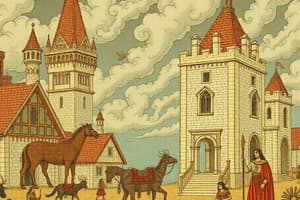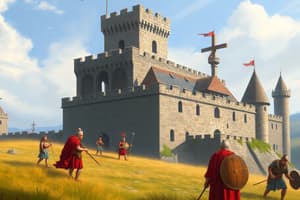Podcast
Questions and Answers
What underlying themes does the Beowulf-poet explore through heroic tales?
What underlying themes does the Beowulf-poet explore through heroic tales?
The Beowulf-poet explores themes such as the nature of success, true friendship, and the value of life and death.
How did the Roman Empire influence the English language?
How did the Roman Empire influence the English language?
The Roman Empire influenced the English language through the establishment of Latin-speaking camps, evident in place names like Lancaster and Manchester.
What caused the decline of Roman influence in Britain during the fifth century?
What caused the decline of Roman influence in Britain during the fifth century?
The decline of Roman influence was caused by the disintegration of the Roman Empire, leading to the withdrawal of Roman troops.
Which groups of people were responsible for invading Britain after the Roman withdrawal?
Which groups of people were responsible for invading Britain after the Roman withdrawal?
What is the origin of the names 'England' and 'English'?
What is the origin of the names 'England' and 'English'?
What was the primary impact of the Roman withdrawal on Britain?
What was the primary impact of the Roman withdrawal on Britain?
Which Germanic tribes are collectively referred to as the Anglo-Saxons?
Which Germanic tribes are collectively referred to as the Anglo-Saxons?
How did the Anglo-Saxons affect the Celtic inhabitants of Britain?
How did the Anglo-Saxons affect the Celtic inhabitants of Britain?
What changes occurred in Britain after the fall of Roman influence around AD 410?
What changes occurred in Britain after the fall of Roman influence around AD 410?
Why did the Anglo-Saxons migrate to Britain around AD 449?
Why did the Anglo-Saxons migrate to Britain around AD 449?
What motivated Beowulf to travel to Zealand?
What motivated Beowulf to travel to Zealand?
How did Beowulf demonstrate his confidence upon meeting Hrothgar?
How did Beowulf demonstrate his confidence upon meeting Hrothgar?
What action did Beowulf take during Grendel's attack?
What action did Beowulf take during Grendel's attack?
What was the immediate consequence of Beowulf's victory over Grendel?
What was the immediate consequence of Beowulf's victory over Grendel?
How did the people react to the news of Beowulf's exploit?
How did the people react to the news of Beowulf's exploit?
What gifts did Hrothgar bestow upon Beowulf after his victory?
What gifts did Hrothgar bestow upon Beowulf after his victory?
What prompted Grendel's mother to attack the hall after Beowulf's victory?
What prompted Grendel's mother to attack the hall after Beowulf's victory?
What were the Old English pronouns that were replaced by the Scandinavian pronouns 'they', 'their', and 'them'?
What were the Old English pronouns that were replaced by the Scandinavian pronouns 'they', 'their', and 'them'?
How did the grammatical structure of Modern English differ from that of Old English?
How did the grammatical structure of Modern English differ from that of Old English?
In Old English, how would the subject 'the king' be written, and how would it be written when used as the object?
In Old English, how would the subject 'the king' be written, and how would it be written when used as the object?
What are the two types of verbs in Old English, and how do they indicate changes in time?
What are the two types of verbs in Old English, and how do they indicate changes in time?
Name the Old English characters used to represent the sound 'th' and provide their modern equivalents.
Name the Old English characters used to represent the sound 'th' and provide their modern equivalents.
What did the sound 'sh' represent in Old English and how was it spelled?
What did the sound 'sh' represent in Old English and how was it spelled?
What effect did the Anglo-Saxons' Germanic heroic society have on their linguistic features?
What effect did the Anglo-Saxons' Germanic heroic society have on their linguistic features?
How many inflected forms does Modern English have in comparison to Old English?
How many inflected forms does Modern English have in comparison to Old English?
Flashcards
Anglo-Saxon Period
Anglo-Saxon Period
The period in British history after the Romans left (around 410 AD), when tribes from Germany and Scandinavia invaded and took control of most of Britain.
Who were the Anglo-Saxons?
Who were the Anglo-Saxons?
These Germanic tribes (Angles, Saxons, and Jutes) were skilled warriors and sailors who came from the North Sea region. They were looking for new land due to overcrowding and resource scarcity.
What happened to the Britons after the Anglo-Saxons arrived?
What happened to the Britons after the Anglo-Saxons arrived?
The Anglo-Saxons pushed the native Britons westwards into the highlands of Wales and Cornwall. In some areas, they coexisted with the Britons, but in others, they drove them out completely.
What happened to the language in Britain?
What happened to the language in Britain?
Signup and view all the flashcards
What did the Anglo-Saxon arrival mean for Britain?
What did the Anglo-Saxon arrival mean for Britain?
Signup and view all the flashcards
Roman Legions in Britain
Roman Legions in Britain
Signup and view all the flashcards
Anglo-Saxons
Anglo-Saxons
Signup and view all the flashcards
Old English (Anglo-Saxon)
Old English (Anglo-Saxon)
Signup and view all the flashcards
Celts
Celts
Signup and view all the flashcards
Evolution of English
Evolution of English
Signup and view all the flashcards
Inflected Language
Inflected Language
Signup and view all the flashcards
Thorn and Edh
Thorn and Edh
Signup and view all the flashcards
Strong vs. Weak Verbs
Strong vs. Weak Verbs
Signup and view all the flashcards
Word Order in Modern English
Word Order in Modern English
Signup and view all the flashcards
Old English vs. Modern English
Old English vs. Modern English
Signup and view all the flashcards
Heroic Code of Anglo-Saxons
Heroic Code of Anglo-Saxons
Signup and view all the flashcards
Grendel's mother
Grendel's mother
Signup and view all the flashcards
What is Heorot?
What is Heorot?
Signup and view all the flashcards
Where does Beowulf's journey begin?
Where does Beowulf's journey begin?
Signup and view all the flashcards
Who is Beowulf?
Who is Beowulf?
Signup and view all the flashcards
Who is Grendel?
Who is Grendel?
Signup and view all the flashcards
What is epic poetry?
What is epic poetry?
Signup and view all the flashcards
What is a mead-hall feast?
What is a mead-hall feast?
Signup and view all the flashcards
Study Notes
Roman Britain
- Roman roads connected towns, but Britain remained a rural society.
- Romans introduced their language, social customs, and religion, though few traces remain.
- Roman rule lasted nearly 400 years.
- Decline of Rome after AD 300 led to increased trouble in Britain.
- Barbarian raids from Ireland, Scotland, and Germany intensified.
- Roman troops withdrew from Britain in AD 410 due to barbarian attacks on Italy and Gaul.
- Britons, lacking Roman protection, were easily conquered by invading tribes.
- Some Britons maintained imperial ties, but towns declined and tribal warfare resumed.
- Celtic language, incorporating Latin words, became dominant again.
- Britain faced vulnerability to foreign invasion.
Anglo-Saxon Arrival
- Germanic tribes (Angles, Saxons, Jutes) arrived in England around AD 449.
- These tribes were skilled warriors and seamen, but their homelands were inadequate, with poor soil and flooding.
- Anglo-Saxons established a foothold at the Thames and expanded throughout Britain.
- Celts were driven west into Wales.
- Anglo-Saxons possibly coexisted with Britons in the Northeast, but expelled them in the Southeast .
The Beowulf Poet
- Beowulf is a heroic epic with themes of success, friendship, and life/death.
- The poet presents serious and compelling conclusions based on the tale.
- The poem contains elements similar to fairy tales, with monsters and dragons.
Changing English Language
- Early inhabitants of Britain were Celtic speakers.
- Roman invasion (55 BC, AD 43) brought Latin influence, especially in town names (e.g., Lancaster, Manchester, Worcester).
- Latin word "castrum" (camp) contributed suffixes (-caster, -chester, -cester).
- Germanic tribes (Jutes, Angles, Saxons) invaded after Roman withdrawal, driving Celts to Brittany, Wales, and Cornwall.
- Celtic languages (Welsh, Irish, Scots Gaelic, Breton) survived.
- Germanic invaders spoke Old English (or Anglo-Saxon).
- The Angles settled in the region from the Thames to northern England, influencing the names England and English.
- Scandinavian influences on pronoun usage( they, their, them).
- Old English was a heavily inflected language, with changes in spelling altering sentence meaning.
- Old English verbs categorized as strong (vowel changes) or weak (adding d/t suffix).
- Modern English relies more on word order for meaning.
- Old English used symbols (þ/ð) for th, and sc for sh.
Anglo-Saxon Prosody
- Anglo-Saxons had a Germanic heroic code centered around kinship.
- The poem “Beowulf” portrays a heroic society.
- Beowulf travels to Denmark to fight Grendel.
- Initially, Beowulf faces challenges from Hunferth but ultimately defeats Grendel, taking his arm.
- Grendel's mother seeks revenge, leading to further conflict..
- The poem details Beowulf's victory against Grendel's mother, as well as the ensuing celebrations.
- Anglo-Saxon oral tradition: hero's exploits, poetic elements, and emphasis on kinship.
Studying That Suits You
Use AI to generate personalized quizzes and flashcards to suit your learning preferences.




